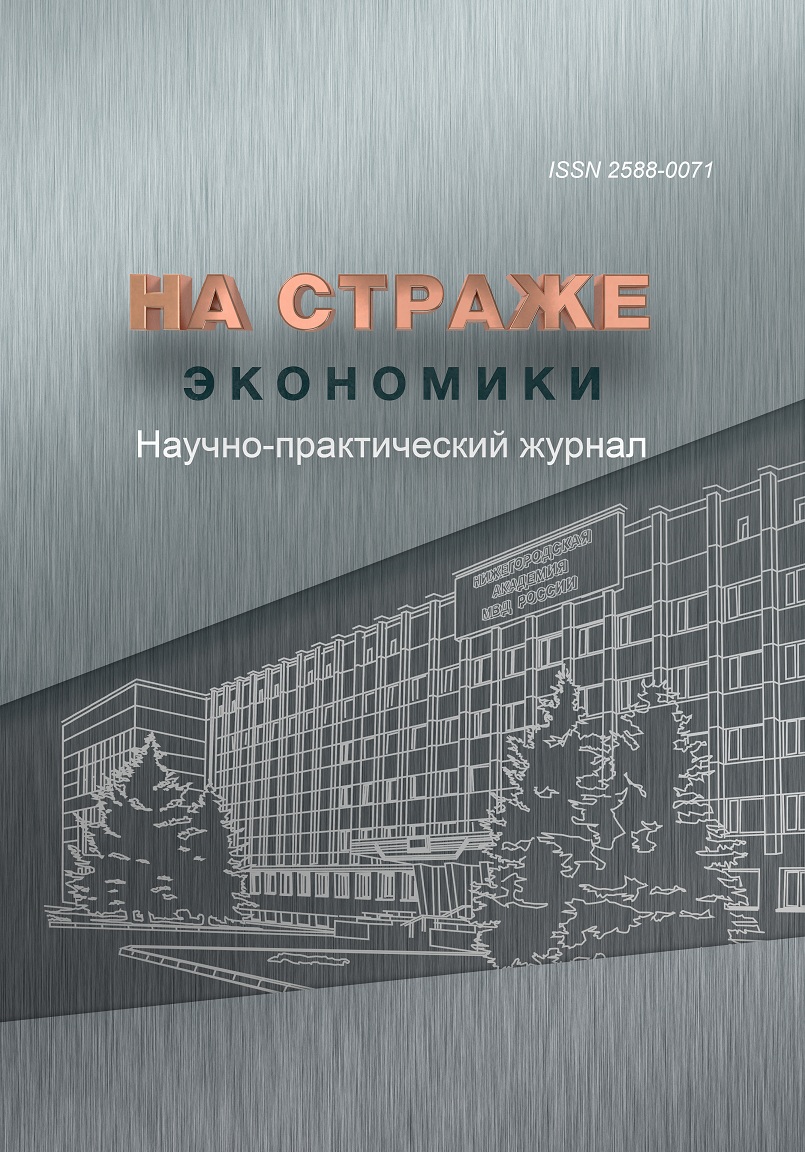The article discusses the impact of digitalization risks on ensuring the economic security of regions. The relevance of the research topic is due to changes in the trends in the deve-lopment of economic relations related to the digitalization of the economy. The article notes that the identification of risks and threats makes it possible to develop risk minimization procedures, draw up tactical and strategic plans focused on the prevention of risks and threats (“Mitigation”), the second stage - providing for measures and procedures if a risky situation has already occurred and it is necessary to eliminate the consequences or minimize losses from the occurrence of a risky event (“Contingency”). Special attention is paid to the classification of types and types of risks of digitalization. Based on the conducted research, the main types of risks are identified: the risks of using foggy and cloud technologies; the risks of fraud and violation of information confidentiality; the risks of technological lag, distributed by subgroups: software and hardware. It is noted that the improvement of digitalization procedures increases the convenience of calculations and the quality of life, allows you to optimize the processes in the activities of both legal entities and individuals, at the same time, has a significant impact on the economic security of legal entities and individuals, due to the high level of risk. In conclusion, examples of minimizing the risks of digitalization are given and tools and mechanisms for minimizing risks are proposed.
economic security, digitalization, digital transformation, risks of digitalization, digital technologies, cryptocastodian
1. Ministry of Digital Development, Communications and Mass Media of the Russian Federation (Ministry of Finance of Russia): official website. Moscow. Updated during the day. URL: https://digital.gov.ru/ru/ministry/common / (accessed 19.11.2023). (In Russ.)
2. URL: http://aklugovoy.ru / (accessed 19.11.2023). (In Russ.)
3. Bogatyrev A. V., Bardakov A. A., Bubnova O. Y. Actual issues of ensuring economic security of industrial enterprises. Economics and Management in mechanical engineering, 2023, no. 4, pp. 8–12. (In Russ.)
4. Bogatyrev A. V., Kharitonov A. O. The concept of a process approach to ensuring economic security. Promising directions for improving the management of internal affairs bodies in modern conditions: a collection of articles based on the materials of the International Scientific and Practical Conference, Nizhny Novgorod, June 16, 2022. Nizhny Novgorod: Nizhny Novgorod Academy of the Ministry of Internal Affairs of the Russian Federation Publ., 2023. Pp. 10–15. (In Russ.)
5. Chernyshenko D. By the end of 2025, over 385 thousand people will graduate from Digital departments. URL: http://government.ru/news/49345 / (accessed 19.11.2023). (In Russ.)
6. Kalavry T. Yu., Gordyachkova O. V. Tools of the digital economy. Moscow: Mir nauki Publ., 2022. URL: https://izd-mn.com/PDF/66MNNPU22.pdf (accessed 19.11.2023). (In Russ.)
7. Minakov A. V., Suglobov A. E. Problems of development of the digital economy of the regions of Russia. Issues of regional economics, 2022, no 4 (53), pp. 63–72. (In Russ.)
8. Serebryakova T. Yu., Gordeeva O. G. Risks of the organization: their accounting, analysis and control: monograph. Moscow: SIC Infra-M Publ., 2019. 233 p. (In Russ.)
9. Serebryakova T. Y., Anisimov A. S. Methodological aspects of risk-based monitoring of economic security of management companies of apartment buildings. Economic analysis: theory and practice, 2023, vol. 22, no. 3 (534), pp. 521–533. (In Russ.)
10. Shablakov A. D., Solovyova I. A. Risk assessment of the introduction of end-to-end digital technologies in industry. Bulletin of the South Ural State University. Series: Economics and Management, 2023, vol. 17, no. 2, pp. 133–143. (In Russ.)
11. Economic security of economic entities: modern approaches / N. N. Makarova, G. V. Timofeeva, S. V. Bank, S. A. Khmelev. Moscow: RIOR Publ., 2022. 148 p. (In Russ.)
12. Eskindarov M. A., Maslennikov V. V., Maslennikov O. V. Risks and chances of the digital economy in Russia. Finance: Theory and Practice, 2019, no 23 (5), pp. 6–17. URL: https://doi.org/10.26794/2587-5671-2019-23-5-6-17 (accessed 19.11. 2023). (In Russ.)
13. Economic Security in International Cooperation: Risk Overview and Risk Management Perspectives / A. E. Suglobov, D. M. Pimenov, S. A. Hmelev [and other]. Cooperation and Sustainable Development: conference proceedings, Moscow, December 15–16, 2020. Vol. 245. Cham: Springer Nature Switzerland Publ., 2022. Pp. 1061–1067. (In Russ.)
14. IT will help to overcome Russia’s technological lag in the hardware field. URL: https://www.vnedra.ru /novosti/it-pomozhet-preodolet-tehnologicheskoe-otstavanie-rossii-v-apparatnoj-oblasti-10828/?ysclid=lon0ldse51938563267 (accessed 19.11.2023). (In Russ.)
15. Kaspersky N. On the risks of digitalization. URL: https://dzen.ru /a/YMowT_ fdxm Sxzg2l (accessed 19.11.2023). (In Russ.)
16. The Fourth Industrial Revolution. Targets for the development of industrial technologies and innovations. URL: http://www3.weforum.org /docs/WEF (accessed 19.11.2023). (In Russ.)
17. Eleven risks when working with big data. URL: https://rb.ru/opinion/data-risks / (accessed 19.11.2023). (In Russ.)
18. The Criminal Code of the Russian Federation no. 63-FZ of June 13, 1996. URL: https://base .garant.ru/10108000 / (accessed 19.11.2023). (In Russ.)
19. Rodina I. B. Advantages and risks of digital national currency in the context of global risks. Fundamental research, 2021, no. 12, pp. 186–191. URL: https://fundamental-research.ru/ru/article/view?id=43174 (accessed 19.11.2023). (In Russ.)
20. Sergeev L. I., Yudanova A. L. Digital economy: textbook for universities / ed. by L. I. Sergeev. Moscow: Yurait Publ., 2022. 332 p. (In Russ.)










